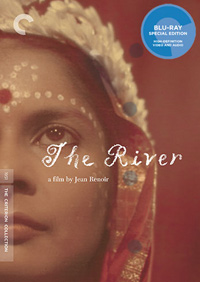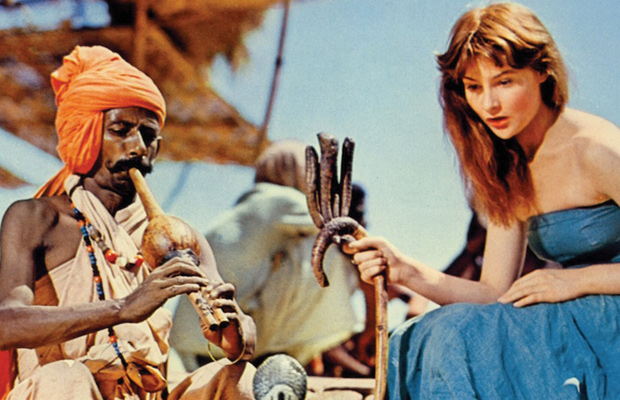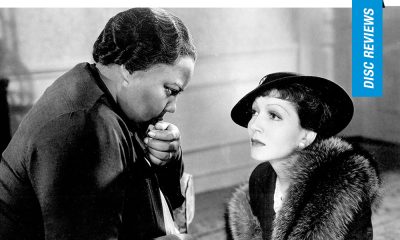Disc Reviews
Criterion Collection: The River | Blu-ray Review
 Criterion repackages Jean Renoir’s 1951 classic The River for Blu-ray, one of the master filmmaker’s several titles in the collection (fans may recall that Renoir’s Grand Illusion was the very first Criterion title). A title significant in many respects, being the first Technicolor film in India and Renoir’s first color feature, it’s simplistic beauty has gone on to influence future generations of filmmakers, including its prominently vocal champion Martin Scorsese. It also served as a launching pad for Satyajit Ray, who worked as an assistant on the film, and who would go on to create his own stunning debut four years later with the first chapter of his Apu trilogy, Pather Panchali (1955).
Criterion repackages Jean Renoir’s 1951 classic The River for Blu-ray, one of the master filmmaker’s several titles in the collection (fans may recall that Renoir’s Grand Illusion was the very first Criterion title). A title significant in many respects, being the first Technicolor film in India and Renoir’s first color feature, it’s simplistic beauty has gone on to influence future generations of filmmakers, including its prominently vocal champion Martin Scorsese. It also served as a launching pad for Satyajit Ray, who worked as an assistant on the film, and who would go on to create his own stunning debut four years later with the first chapter of his Apu trilogy, Pather Panchali (1955).
We experience the childhood of Harriet (Patricia Walters) in retrospect, her off-screen adult voice recounting one particular stretch of time while growing up in India with her mother (Nora Swinburne) and father (Esmond Knight). Her family is friendly with their other English neighbor, Mr. John (Arthur Shields), who has a mixed-race daughter Melanie (Radha), a woman who has recently left the convent to come stay with her father. While Harriet has a gaggle of younger siblings, she grows close with Valerie (Adrienne Corri), whose father owns the factory that Harriet’s dad manages. A stranger has come into their midst, Captain John (Thomas E. Breen), an American soldier that’s lost his leg in combat, his wounded pride bringing him to stay in a far off land with his cousin. Harriet is immediately enamored with the handsome stranger, and dismayed that Valerie seems to throw herself at his feet. However, the Captain seems to hold a reserved attraction for the mixed-race Melanie, a woman that can relate to feeling like an outsider wherever she goes.
Renoir aficionados tend to glorify Renoir’s The River, in some circles its reputation eclipsing the filmmaker’s favored title The Rules of the Game (1939). In many ways, The River is an important stepping stone, signifying a very peripheral cinematic introduction to Indian culture (something that would eventually be plundered in decades of representation to come from white filmmakers) as well as revitalization for Renoir, coming out of a troubled decade in Hollywood, where he fled to following the Nazi occupation of France. It’s the director’s first title following the significantly maligned noir The Woman on the Beach (1947), a muddled endeavor thanks to studio interference, the end result of which caused significant public embarrassment. And so The River seems like one of those instances of fortune, a fluke produced by one-time producer Kenneth McEldowney that would score a listing as one of the best films that year by the National Board of Review as well as receive a BAFTA nomination and an award at the Venice Film Festival.
Symbolic in its navigation of life’s cyclical patterns, as intimated by its simplistic title, The River feels very much like something that would have been directed by David Lean or Powell & Pressburger. It’s no surprise to learn that author Rumer Godden also penned Black Narcissus (1947), which inspired the film by Powell & Pressburger, though Godden was vocally opposed to their adaptation. Scorsese also credits Claude Renoir’s cinematography in The River with being on par with the visual beauty of Powell & Pressburger’s famed The Red Shoes (1948).
With uncredited actress June Hillman providing the omniscient narration (sounding very much like Deborah Kerr), The River is indeed sumptuously photographed. But its rendering, a visually evocative portrayal of the circle of life as evidenced by the experiences of three young women, is often too simplistic in other regards. Those that prize and appreciate the sexual undertones of Black Narcissus may likely find The River to be achingly naive, though this is appropriate considering it’s from the perspective of an adolescent girl.
The film’s reflection of Indian culture feels very introductory and tentative, and it would be remiss to ignore the film’s limitations. True, Renoir has taken pains to show India without resorting to fetishism or exploitation, but the British family at the heart of this tale still seems perilously privileged, and those sensitive to depictions of white superiority in post-colonialist narratives may find Renoir’s film too dated to cherish as resoundingly as a legion of critics have since it premiered. The adult Harriet opens the film announcing her family’s ‘special flavor’ as being white and growing up in India. In a discussion with her mother concerning whether she’s beautiful or not, Harriet is told that “the most surprising people are beautiful—look at Nan,” a reference to their housekeeper played by Suprova Mukerjee.
More troubling is the nonchalant handling of Melanie, the mixed race character whose father is white and mother is Indian. Her father, Mr. John, is shown to be greatly distressed about what will become of his daughter. “I don’t know where you belong,” he admits. Appallingly, he casually muses aloud to her, “maybe you shouldn’t have been born.” Renoir’s depiction of Melanie, a character that does not appear in Godden’s novel, is an inspired addition on the filmmaker’s part, though her plight seems handled aloofly. Over a decade later, Satyajit Ray would handle a similar character with less conservative distancing in the mixed race character Edith in his elegant The Big City (1963).
Disc Review:
A high-definition digital transfer from the 2004 restoration by The Film Foundation, The River remains as vibrant as ever. The lush Technicolor is definitely reminiscent of The Red Shoes, with Adrienne Corri and Patricia Walter’s coarse manes of red hair dominating the frame similarly to that of Marius Goring in the Powell & Pressburger feature. The disc is a definite gem for a Blu-ray upgrade, and we can only hope that Criterion eventually does the same for several other Renoir titles in the collection, particularly the color titles that followed, like French Cancan, The Golden Coach, and Elena and Her Men.
Renoir Intro:
From the initial theatrical release, we have a near eight minute intro from Renoir himself discussing his interest in the project, initiated from reading a review of the novel in The New Yorker.
Martin Scorsese Interview:
From 2004, we have a thirteen minute segment of Scorsese discussing how the film affected and inspired him since seeing it as a young child.
Around the River:
A fascinating documentary by filmmaker Arnaud Mandagaran features a bevy of notable names that weigh in on the making of the film, including Alain Renoir, Satyajit Ray, and James Ivory.
Audio Interview w/producer Kenneth McEldowney:
Forty plus minutes of audio interview footage with one-time producer Kenneth McEldowney is included, who has a rather interesting story concerning his involvement.
Jean Renoir: A Passage Through India:
A fifteen minute video essay from film writer Paul Ryan weighs in on Renoir’s title.
Final Thoughts:
If its narrative seems too conservatively rendered, too primly unconcerned with deeper issues even as it deftly captures the perspective of a teenage girl growing up with a privileged perspective in another culture, Renoir captures perfectly the essence of life as a constant revolution of stages. Metamorphosis is a constant leitmotif, with Captain John referring to Valerie as a kitten, while Melanie is compared to a butterfly. The death of Bogey is swiftly followed by a new entry into their family, visually announced by the prominent parade of flowering trees. A must see for Renoir fans, the title’s towering reputation may disappoint those hoping for a more enlightened storyline.
Film: ★★★/☆☆☆☆☆
Disc: ★★★★/☆☆☆☆☆
Los Angeles based Nicholas Bell is IONCINEMA.com's Chief Film Critic and covers film festivals such as Sundance, Berlin, Cannes and TIFF. He is part of the critic groups on Rotten Tomatoes, The Los Angeles Film Critics Association (LAFCA), the Online Film Critics Society (OFCS) and GALECA. His top 3 for 2021: France (Bruno Dumont), Passing (Rebecca Hall) and Nightmare Alley (Guillermo Del Toro). He was a jury member at the 2019 Cleveland International Film Festival.

































